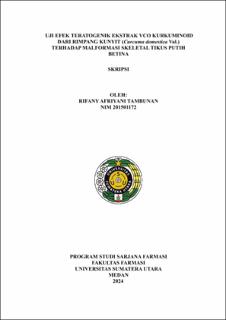| dc.description.abstract | Background: Turmeric (Curcuma domestica Val.) rhizomes which contain the main compound, namely curcuminoids, are known to have immunomodulatory activity. It has the potential to be developed into a herbal medicine and is safe for use in the community, including pregnant women.
Objective: This study aims to determine the teratogenic effect of curcuminoid VCO extract from turmeric rhizomes (Curcuma domestica Val.) which can cause teratogenic effects on the fetuses of female white rats.
Methods: Curcuminoid VCO extract was obtained using the Microwave Assisted Extraction (MAE) method with VCO as a solvent. Then, curcuminoids were identified from VCO curcuminoid extract using TLC. The teratogenic effect test was carried out by giving test preparations to pregnant mice which were divided into 5 groups, namely the normal control group, VCO curcuminoid extract at doses of 400, 800, 1000 mg/kg bw and the positive control Gabapentin 48 mg/kg bw, during the organogenesis period. Skeletal malformations of female white rat fetuses using a microscope and looking at the addition or reduction of the skeleton in the bone tissue. Results: Based on this research, administration of curcuminoid VCO extract from turmeric rhizomes (Curcuma domestica Val.) to pregnant rats during the organogenesis period at doses of 800 and 1000 mg/kgBB caused teratogenic effects on pregnant rats in the form of resorption, inhibition of growth and development of the skeleton including the sternum, carpals. (metacarpal, proximal phalanx, and distal phalanx) and tarsal (metatarsal, proximal phalanx, and distal phalanx), as well as delayed bone ossification. Conclusion: It can be concluded that the curcuminoid VCO extract (Curcuma domestica Val.) causes a teratogenic effect on skeletal malformations of female white rats given during the organogenesis period. | en_US |


